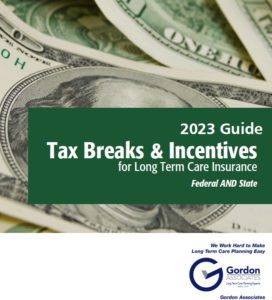Traditional Long-Term Care Insurance Policies
What is a traditional long-term care insurance policy?
A traditional long-term care insurance policy is a contract that provides financial coverage for long-term care expenses, such as nursing home or home healthcare, when you can’t perform daily activities independently. It safeguards your assets and savings from these costs.
How does a traditional policy work?
With a traditional policy, you pay regular premiums to the insurance company, and in return, the policy offers benefits to cover the costs of long-term care services. The policy’s conditions and benefit amount are specified in the contract. Traditional long term care insurance policies have evolved since their launch in the 1960s. They’re not our grandfather’s policies anymore!
What are the benefits of a traditional policy?
Traditional policies offer dedicated long-term care coverage, providing security and peace of mind. They typically offer a wide range of care settings, giving you flexibility in choosing care options.
What are the drawbacks of a traditional policy?
The premiums for traditional policies may increase over time. If you never require long-term care, you won’t receive any benefits, which might feel like money spent without immediate return.
Can I get a traditional policy if I have health issues?
Obtaining a traditional policy with pre-existing health issues can be challenging. Insurance companies may charge higher premiums or exclude specific conditions from coverage. It’s important to consider your health when making a decision.
What are the tax benefits of a traditional policy?
Premiums for traditional long-term care insurance policies may be tax-deductible, and the benefits are often received tax-free, providing potential tax advantages. Tax benefits exist both at the federal and state level (depending on your state of residence). We advise you to talk with your accountant for specifics related to you.
How do I apply for a traditional policy?
You can apply for a traditional policy through an insurance agent or directly through an insurance company. If you work with us, we will assess your needs with you, solicit quotes from a number of insurance carriers, present you with the best options, and answer all of your questions. We’ll also help you submit your application. You can get that process started on our request a quote page.
Hybrid Long-Term Care Insurance Policies
What is a hybrid long-term care insurance policy?
A hybrid long-term care insurance policy combines life insurance and long-term care coverage. It offers benefits for both scenarios, providing versatility and value.
How does a hybrid policy work?
With a hybrid policy, you make premium payments, either as a lump sum or regular installments, in exchange for a death benefit, long-term care coverage, or a combination of both. This dual-purpose nature sets it apart from traditional policies.
What are the benefits of a hybrid policy?
Hybrid policies offer flexibility, allowing you to benefit from both long-term care coverage and life insurance. If you never need long-term care, your heirs receive the death benefit, offering more financial security.
What are the drawbacks of a hybrid policy?
Hybrid policies can have higher upfront costs compared to traditional policies. You’re essentially paying for two types of coverage in one policy, and the life insurance component might not be needed if you already have life insurance.
Can I get a hybrid policy if I have health issues?
Some hybrid policies have more lenient underwriting criteria, making them accessible to individuals with certain health issues. This can be an advantage if you’re concerned about traditional policies’ strict health requirements.
What are the tax benefits of a hybrid policy?
Tax advantages for hybrid policies can vary, so it’s advisable to consult a tax professional for specific guidance on your situation.
How do I apply for a hybrid policy?
You can apply for a hybrid policy through an insurance agent or directly through an insurance company. If you work with us, we will assess your needs with you, solicit quotes from a number of insurance carriers, present you with the best options, and answer all of your questions. We’ll also help you submit your application. You can get that process started on our request a quote page.
Long-Term Care Planning
When should I start planning for long-term care?
We look at planning for long term care in the context of an overall financial plan. An overall plan includes retirement, debt, college (if you have children), and other important elements. We recommend that the best age to consider Long Term Care Insurance is when your overall financial plan is in order.
Why would I buy a Long Term Care Insurance policy if I’m not sure I’d use it?
We add a reminder that Long Term Care Insurance is just that – insurance. We have insurance in our lives in case something happens that would be big and expensive…damage to our homes (home insurance), a work injury in which we can’t work (disability insurance), a robbery at home (umbrella policy), and so on. In each case, we hope we never have to use any of those policies. In each case we don’t know how disruptive and expensive those events might be, but we think they’d be expensive enough that we’d rather have the insurance than risk paying for it on our own.
What are other financial options for long-term care besides insurance?
In addition to insurance, you can explore self-funding, Medicaid, or long-term care annuities as alternatives to cover the costs of long-term care services. Each option has its own pros and cons, so it’s important to assess which one aligns with your financial goals and circumstances.
Where can I get more information and quotes for these policies?
To gather more information and obtain insurance quotes for traditional and hybrid policies, you can visit https://galtci.com/ or contact licensed insurance agents who can provide personalized guidance based on your needs and preferences.
What if I change my mind after buying a policy?
Review the policy’s cancellation terms. You may be able to get a refund if you decide it’s not the right choice. It’s essential to understand the policy’s terms and conditions, including its grace period and any money-back guarantees. Be sure to consult with your insurance provider to clarify the specific details of cancellation.

 To help determine if long-term care (LTC) insurance is right for you, we are offering a FREE informational guide. This is a comprehensive booklet that will answer many of your questions about tax breaks and incentives for LTCI for federal and state taxes.
To help determine if long-term care (LTC) insurance is right for you, we are offering a FREE informational guide. This is a comprehensive booklet that will answer many of your questions about tax breaks and incentives for LTCI for federal and state taxes. To help determine if long-term care (LTC) insurance is right for you, we are offering a FREE informational guide. This is a comprehensive booklet that will answer many of your questions about LTC and assist you with your health care planning.
To help determine if long-term care (LTC) insurance is right for you, we are offering a FREE informational guide. This is a comprehensive booklet that will answer many of your questions about LTC and assist you with your health care planning.